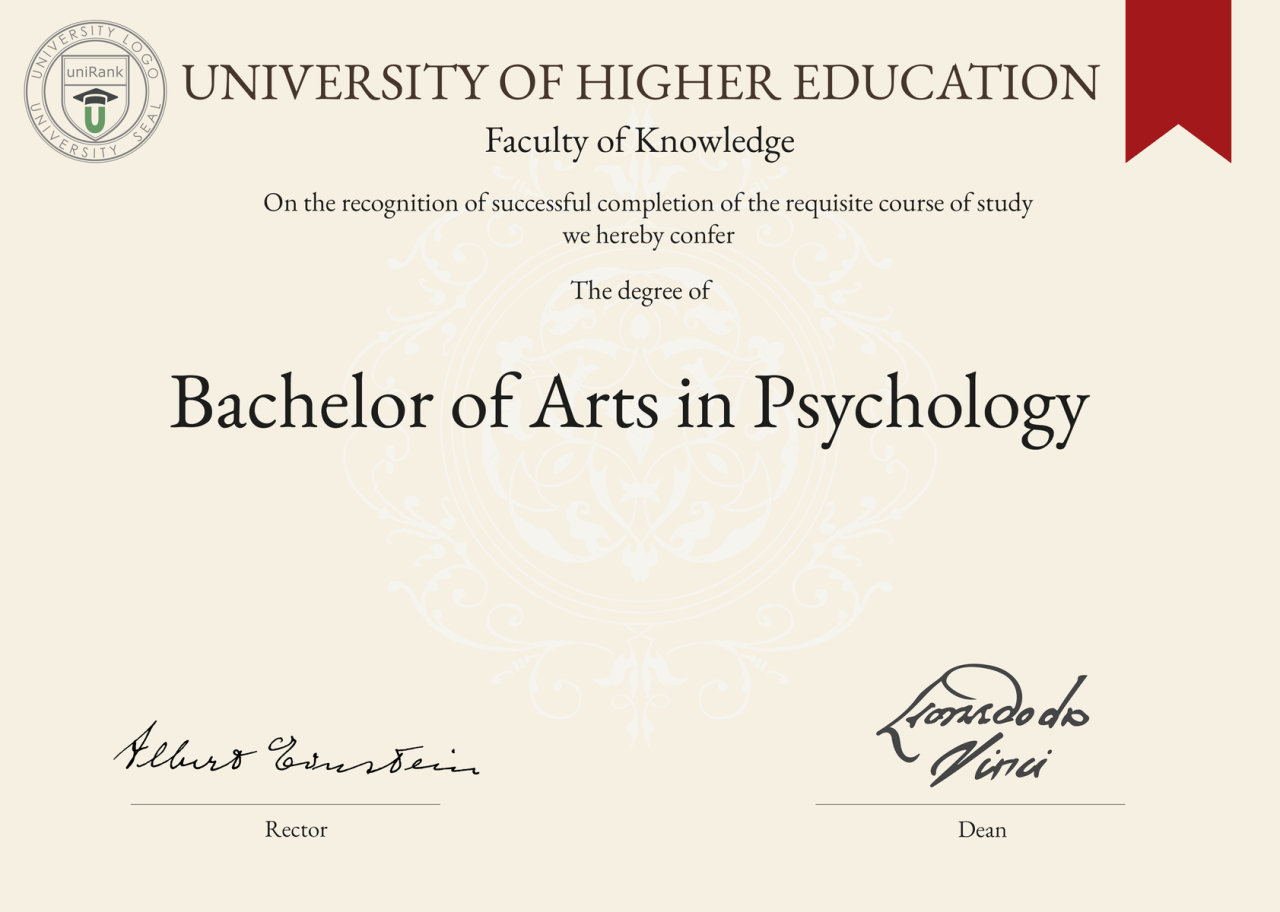
A bachelor’s degree in psychology delves into the fascinating world of human behavior, cognition, and emotions. This field of study explores the intricacies of the mind, examining how individuals think, feel, and interact with the world around them.
Psychology is a diverse discipline, encompassing various subfields like cognitive psychology, social psychology, and developmental psychology. Each subfield offers unique perspectives on human behavior, providing a comprehensive understanding of the human experience.
What is a Bachelor’s Degree in Psychology?
A bachelor’s degree in psychology is an undergraduate degree that provides a foundational understanding of human behavior and mental processes. This degree equips individuals with the knowledge and skills necessary to analyze, interpret, and understand the complexities of human thought, emotion, and behavior.
Core Areas of Study in Psychology
Psychology encompasses a vast and diverse range of areas of study. Here are some of the most common core areas explored in a bachelor’s degree program:
- Cognitive Psychology: This area focuses on how people think, learn, remember, and solve problems. It explores topics such as attention, perception, memory, language, and decision-making.
- Social Psychology: Social psychology examines how individuals think, feel, and behave in social situations. It investigates topics such as group dynamics, social influence, attitudes, prejudice, and aggression.
- Developmental Psychology: This area studies how people change and develop throughout their lifespan, from infancy to adulthood. It explores topics such as cognitive development, social development, emotional development, and language development.
- Personality Psychology: Personality psychology focuses on understanding individual differences in personality traits, motivations, and behaviors. It explores theories of personality, such as the Big Five personality traits, and investigates how personality influences behavior.
- Clinical Psychology: Clinical psychology focuses on the diagnosis, treatment, and prevention of mental health disorders. It explores various psychological theories and techniques used in therapy, such as cognitive-behavioral therapy (CBT) and psychodynamic therapy.
Types of Psychology Degrees
There are two main types of bachelor’s degrees in psychology:
- Bachelor of Arts (B.A.) in Psychology: This degree typically emphasizes the social and cultural aspects of psychology, focusing on areas like social psychology, developmental psychology, and personality psychology. It often requires coursework in humanities and social sciences.
- Bachelor of Science (B.S.) in Psychology: This degree emphasizes the scientific and research aspects of psychology, focusing on areas like cognitive psychology, experimental psychology, and neuroscience. It often requires coursework in statistics, research methods, and biology.
Curriculum and Coursework
A bachelor’s degree in psychology is a comprehensive program that covers a wide range of topics, from the foundations of human behavior to the application of psychological principles in various settings. The curriculum is designed to provide students with a solid understanding of the field and prepare them for careers in research, clinical practice, or other related fields.
The coursework typically includes a combination of core courses, elective courses, and practicum experiences. The core courses provide a foundational understanding of the field, while the elective courses allow students to explore their interests in greater depth. Practicum experiences offer hands-on learning opportunities in real-world settings.
Core Courses
Core courses in a psychology program provide a comprehensive understanding of the field’s fundamental principles and theories. These courses are essential for building a strong foundation in psychology and preparing students for advanced study or professional careers. The following are some typical core courses in a psychology program:
- Introduction to Psychology: This course provides an overview of the field of psychology, covering its history, major perspectives, and key research methods. It introduces students to the fundamental concepts and theories that underpin the study of human behavior.
- Statistics: Psychology relies heavily on statistical methods for analyzing data and drawing conclusions. This course teaches students the basic principles of statistical analysis, including descriptive statistics, inferential statistics, and hypothesis testing. This knowledge is essential for conducting research and interpreting psychological findings.
- Research Methods: This course focuses on the scientific methods used in psychology research. Students learn about different research designs, data collection techniques, and ethical considerations in research. They also gain experience in designing and conducting their own research projects. This course is essential for students who are interested in pursuing careers in research or academia.
- Developmental Psychology: This course explores the changes in human behavior and cognitive abilities throughout the lifespan, from infancy to adulthood. It examines the biological, cognitive, social, and emotional factors that influence development. Students learn about theories of development, research methods, and applications of developmental psychology to real-world issues.
- Abnormal Psychology: This course focuses on the nature, causes, and treatment of psychological disorders. Students learn about different diagnostic categories, theories of psychopathology, and various therapeutic approaches. This course is essential for students who are interested in clinical psychology, counseling, or other mental health professions.
- Social Psychology: This course examines how individuals think, feel, and behave in social situations. It explores topics such as social perception, group dynamics, attitudes, and persuasion. Students learn about the social factors that influence human behavior and the impact of social interactions on individuals and groups.
- Cognitive Psychology: This course focuses on the mental processes involved in acquiring, storing, and retrieving information. It explores topics such as attention, memory, language, problem-solving, and decision-making. Students learn about the cognitive mechanisms that underlie human thought and behavior.
Elective Courses
Elective courses allow students to explore their interests in psychology more deeply and specialize in particular areas. These courses offer a diverse range of topics, reflecting the broad scope of the field. Here are some examples of elective courses that students might choose based on their interests:
- Biological Psychology: This course explores the biological basis of behavior, including the role of the nervous system, hormones, and genetics in shaping human thoughts, feelings, and actions. Students learn about neuroanatomy, neurophysiology, and the impact of biological factors on psychological processes.
- Personality Psychology: This course focuses on the study of individual differences in personality traits, motives, and values. It explores different theories of personality, such as trait theories, psychodynamic theories, and humanistic theories. Students learn about the assessment and measurement of personality and the factors that influence personality development.
- Health Psychology: This course examines the relationship between psychological factors and physical health. It explores topics such as stress, coping, health behaviors, and the impact of psychological factors on disease prevention and treatment. Students learn about the application of psychological principles to promoting health and well-being.
- Forensic Psychology: This course explores the intersection of psychology and the legal system. It examines topics such as criminal profiling, eyewitness testimony, jury decision-making, and the assessment of criminal responsibility. Students learn about the role of psychologists in the legal system and the ethical considerations involved in forensic psychology.
- Industrial/Organizational Psychology: This course focuses on the application of psychological principles to the workplace. It explores topics such as employee motivation, job satisfaction, leadership, and organizational design. Students learn about the role of psychologists in improving workplace productivity, employee morale, and organizational effectiveness.
Career Paths with a Psychology Degree

A Bachelor’s degree in Psychology opens doors to a wide range of career paths. Graduates can pursue careers in fields such as counseling, research, education, and more. The specific career path you choose will depend on your interests, skills, and career goals.
Career Paths in Psychology
The field of psychology offers a diverse range of career paths. Some common career paths for psychology graduates include:
- Counseling: Psychologists who work as counselors provide therapy and support to individuals, families, and groups. They help clients cope with a wide range of issues, such as mental health disorders, relationship problems, and life transitions.
- Research: Research psychologists conduct studies to understand human behavior and mental processes. They work in academic settings, government agencies, and private organizations.
- Education: Psychologists work in educational settings as teachers, school counselors, and educational psychologists. They may work with students of all ages, providing academic support, counseling, and guidance.
- Human Resources: Psychologists may work in human resources departments, where they apply their knowledge of human behavior to issues such as employee motivation, performance management, and workplace conflict resolution.
- Marketing and Advertising: Psychologists with a background in consumer behavior can work in marketing and advertising, where they help businesses understand and influence consumer behavior.
Qualifications for Specific Careers
The specific qualifications required for a career in psychology will vary depending on the specific role. Some common qualifications include:
- Master’s or Doctoral Degree: Many psychology careers, such as clinical psychology and research, require a master’s or doctoral degree. These advanced degrees provide specialized training and knowledge in a specific area of psychology.
- Licensure: Psychologists who provide therapy or counseling services are typically required to be licensed in the state where they practice. Licensure requirements vary by state, but typically include a graduate degree, supervised experience, and passing an exam.
- Professional Certifications: Some psychology careers, such as human resources management, may require professional certifications. These certifications demonstrate expertise in a specific area of psychology and can enhance career prospects.
Salary and Job Outlook for Psychology Graduates
The salary and job outlook for psychology graduates can vary depending on the specific career path and location.
- Average Salary: According to the U.S. Bureau of Labor Statistics, the median annual salary for psychologists was $80,670 in 2020. The salary range can vary significantly depending on the specific field, experience level, and location.
- Job Outlook: The job outlook for psychologists is expected to be good in the coming years. The U.S. Bureau of Labor Statistics projects a 14% growth in employment for psychologists from 2020 to 2030, which is faster than the average for all occupations.
Skills and Knowledge Developed

A bachelor’s degree in psychology provides students with a comprehensive understanding of human behavior, cognition, and development. It equips them with a valuable set of skills that are transferable to various professions and life situations.
The curriculum emphasizes critical thinking, research methods, data analysis, and communication skills. These skills are essential for understanding and interpreting complex information, solving problems, and effectively communicating findings.
Critical Thinking and Problem-Solving
A psychology degree emphasizes developing critical thinking skills. Students learn to analyze information, identify biases, and evaluate evidence. This ability is crucial in any field that requires decision-making and problem-solving. For example, a marketing manager uses critical thinking to analyze consumer behavior and develop effective marketing strategies.
Research Methods and Data Analysis, Bachelor’s degree in psychology
Psychology students acquire proficiency in research methods and data analysis. They learn how to design and conduct research studies, collect and analyze data, and interpret results. This skillset is valuable in fields such as market research, healthcare, and education, where data-driven decision-making is essential.
Communication Skills
Effective communication is a cornerstone of psychology. Students develop strong written and oral communication skills, enabling them to present complex information clearly and concisely. This skill is essential in professions that involve interacting with clients, patients, or colleagues, such as counseling, social work, and human resources.
Understanding Human Behavior
Psychology provides a foundation for understanding human behavior, including motivation, emotions, and social interactions. This knowledge is applicable in various fields, such as business, marketing, and law, where understanding human behavior is crucial for effective decision-making. For instance, a lawyer uses knowledge of human behavior to understand witness testimony and jury behavior.
Interpersonal Skills
Psychology emphasizes developing interpersonal skills, such as empathy, active listening, and conflict resolution. These skills are valuable in any profession that involves working with people, such as social work, counseling, and human resources. For example, a social worker uses interpersonal skills to build rapport with clients and provide support.
Benefits of a Psychology Degree

A psychology degree offers a wide range of benefits that extend beyond the traditional career paths associated with the field. It equips individuals with valuable skills and knowledge that can enhance personal and professional development, foster a deeper understanding of human behavior, and contribute to societal well-being.
Enhanced Personal Development
A psychology degree can significantly enhance personal development by providing a framework for understanding oneself and others. By studying various psychological theories and concepts, individuals gain insights into their own thoughts, emotions, and behaviors. This self-awareness can lead to personal growth, improved communication skills, and a greater ability to manage stress and navigate challenging situations. For instance, understanding cognitive biases can help individuals identify and challenge their own irrational thoughts, leading to more balanced decision-making.
Choosing a Psychology Program
With so many psychology programs available, choosing the right one can feel overwhelming. It’s crucial to carefully consider your interests, career goals, and the program’s offerings to make an informed decision.
Program Focus and Faculty Expertise
The first step is to determine your area of interest within psychology. Psychology is a broad field, encompassing various specializations like clinical, developmental, cognitive, social, and industrial-organizational psychology. Identifying your area of interest will help you narrow down your program choices. For instance, if you’re interested in clinical psychology, you’ll want to look for programs that offer courses in psychotherapy, psychopathology, and assessment.
Once you’ve identified your area of interest, it’s essential to consider the faculty expertise within the program. Look for programs with professors who have a strong research record in your chosen area and who are actively involved in the field.
Research Opportunities and Internships
Research experience is highly valuable for psychology students, regardless of their career aspirations. It allows you to gain hands-on experience in conducting research, analyzing data, and writing reports. Many psychology programs offer research opportunities through independent studies, assistantships, or lab positions.
Internships are another valuable experience that can provide you with practical experience in a real-world setting. Internships can help you gain skills in assessment, intervention, and program development, depending on the setting.
Matching Program with Career Goals
When choosing a psychology program, it’s important to consider your career goals. If you’re interested in pursuing a doctorate in psychology, you’ll want to look for programs that have a strong track record of placing students in PhD programs.
If you’re interested in a career in clinical psychology, you’ll want to look for programs that are accredited by the American Psychological Association (APA). APA accreditation ensures that the program meets certain quality standards.
Tips for Finding a Suitable Program
Here are some tips for finding a psychology program that aligns with your interests and goals:
- Research programs online and visit university websites to learn more about their offerings.
- Attend college fairs and meet with representatives from different psychology programs.
- Contact faculty members at programs that interest you to ask questions about their research and teaching.
- Consider visiting the campuses of programs you’re interested in to get a feel for the environment.
Epilogue: Bachelor’s Degree In Psychology
A bachelor’s degree in psychology opens doors to a wide array of career paths, empowering individuals to make a positive impact on society. Whether pursuing a career in counseling, research, or education, a psychology degree equips individuals with the skills and knowledge necessary to navigate the complexities of human behavior and contribute to the well-being of others.
Detailed FAQs
What are the job prospects for psychology graduates?
Psychology graduates can pursue a variety of careers in fields like counseling, research, education, and human resources. The specific job prospects depend on the individual’s specialization and career goals.
Is a psychology degree worth it?
A psychology degree provides valuable skills and knowledge that are applicable to many professions and life situations. It can enhance understanding of human behavior and relationships, fostering personal and professional growth.
What are the admission requirements for a psychology program?
Admission requirements vary depending on the institution and program. Generally, applicants need a high school diploma or equivalent, satisfactory academic performance, and may need to submit standardized test scores like the SAT or ACT.





